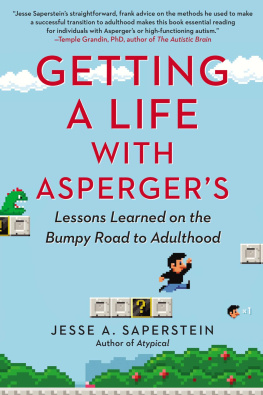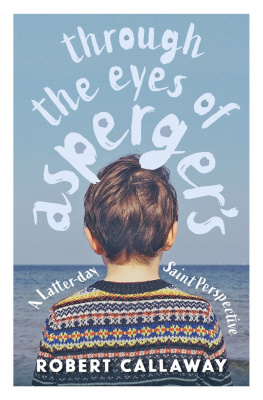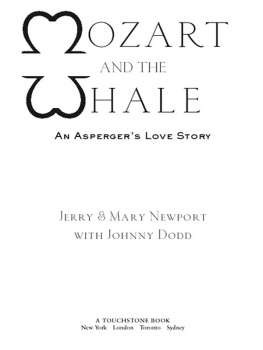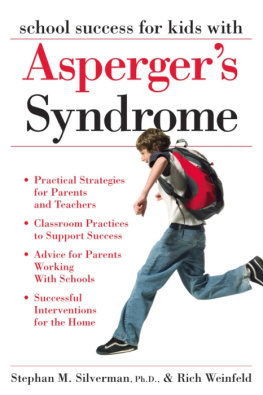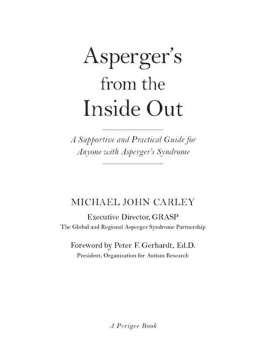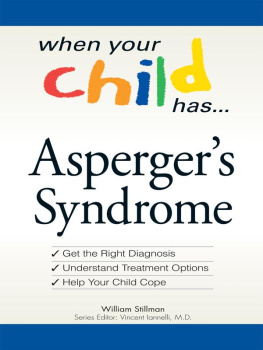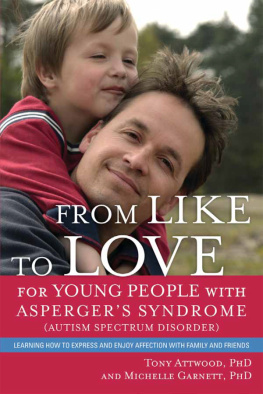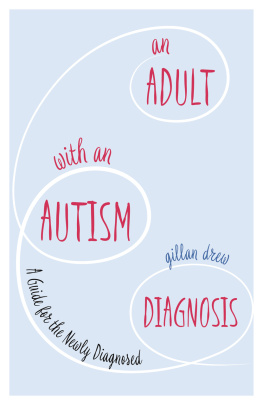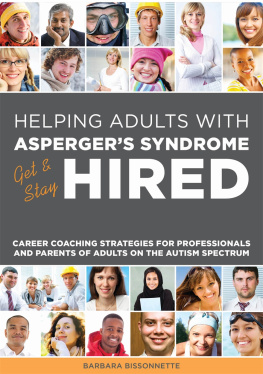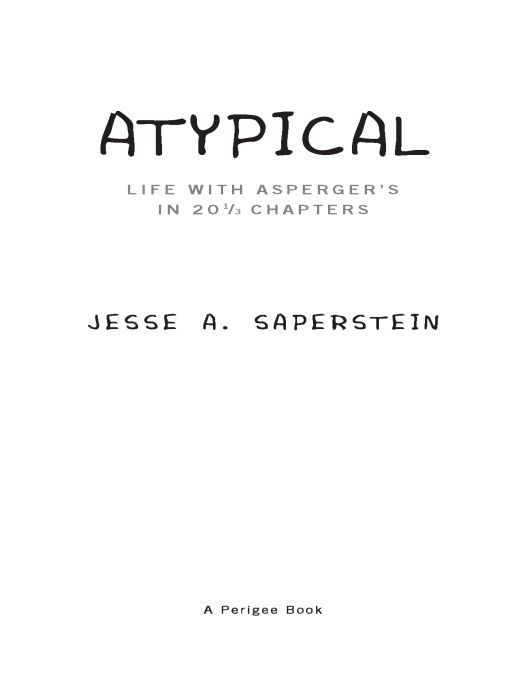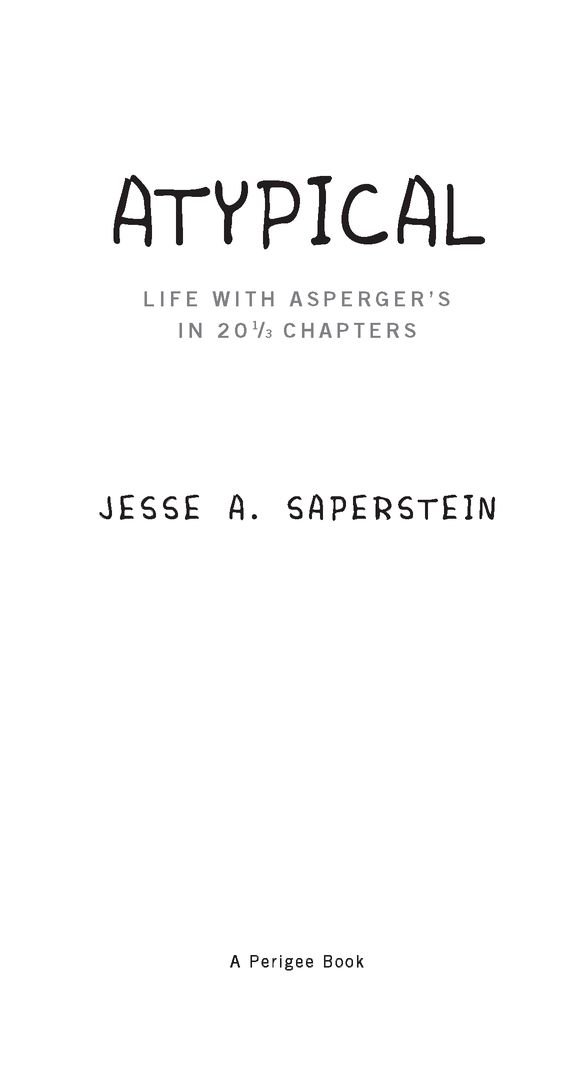Table of Contents
ADVANCE PRAISE FOR ATYPICAL
Brilliant, creative writing. His next book should be a novel.
Temple Grandin, PhD, author of Thinking in Pictures
With a voice as keen and honest as any Ive ever had the pleasure of reading, Jesse Saperstein cracks open the underbelly of life with Aspergers, mesmerizing readers with a tale that is as fabulously incorrigible as it is strikingly compelling. Jesse Saperstein is the son I always wanted!
Liane Holliday Willey, author of Pretending to Be Normal
This funny, poignant, and honest book provides further evidence that Aspergers syndrome is no cookie-cutter diagnosis. Atypical also informs us that Jesse Saperstein is a wonderful addition to the world of Asperger literature.
Michael John Carley,
executive director of the Global and Regional Asperger Syndrome Partnership (GRASP) and author of Aspergers From the Inside Out
Honest, funny, bristling with ideas and intelligence, Jesse A. Sapersteins Atypical marks the debut of a bright young voice from the Aspergers community.
Tim Page, author of Parallel Play and professor at the University of Southern California
Amusing, surprising, and informative. Just when I thought I had learned all I can from personal accounts, I had the chance to read this one!
Jerry Newport, author of Mozart and the Whale, with Mary Newport and Johnny Dodd
Jesse Sapersteins wise and compelling memoir lets us know how frustrating and strange life can be for a bright, resourceful young man with Aspergers navigating the typical world. Funny, irreverent, and ultimately forgiving of all the damage we well-adjusted typicals wreak on those who are a little different from us.
Sigourney Weaver, actress
By describing his experience with honesty, passion, and deep clarity, Saperstein allows a so-called neurotypical like myself to completely identify with his atypicality. A very powerful read.
Bruce Altman, actor
Jesse Saperstein is witty, insightful, and smart. He is also caring, social, emotional, empathetic, and able to learn from his mistakes and other peoples rudenessall traits we are often told that people with Aspergers dont have. I highly recommend this book to parents, educators, community membersfrankly, to everyone. Jesse, I want to know what happens next; I hope you are working on a sequel!
Chantal Sicile-Kira, author of Autism Spectrum Disorders and Autism Life Skills
For Joey DiPaolo and all the campers
of Camp Teens Living a Challenge (TLC).
You were the original catalyst
for everything profound that followed.
And for my grandfather
Dr. Robert Ernest Colby,
who helped me conclude this story.
INTRODUCTION
My earliest childhood memory takes place in a hospital room at age two and a half after the birth of my sister, Dena. She was born on Halloween, of all days, which was an ominous precursor to her Scorpio personality. I was running around the hospital room to release some pent-up energy, as my mother lay helpless in her Percodan-stoned condition. With no other adults in the room to stop me, I found the controls under her bed and ecstatically began operating the mechanical beast with my poor mother along for the ride. It was a novel curiosity how a bed could become animated, and I had the power to manipulate its movements. She handed me a purple stuffed animal to disarm my anticsone of those innocuous monsters from Sesame Street with a bulbous, plastic nose. It produced a silly noise when squeezed. This diversion took my attention away from the bed as annoying, honking sounds filled the room.
As a toddler, my development was atypicalfor someone born with a disability. My mother even had reason to believe I was a genius! At eighteen months, I had already mastered the alphabet, simple arithmetic, and shapes. I was also extremely verbal and affectionate, which (back then) were not typical symptoms of what I would come to be diagnosed with more than ten years later. The most abnormal thing about me was a complete lack of interest in imaginative play, which frustrated my mother, who had spent a small fortune buying me toys. She purchased all the Fisher-Price Little People, with their coifed, plastic manes and hollow chambers where their asses should have been. But I had no interest in them.
When I attended a Vassar College nursery school program at age three, my teachers immediately sensed that something was wrong. I avoided socializing with other children, and making eye contact was as uncomfortable as staring into the blazing sun. Other times, I would pause in the middle of a jigsaw puzzle to vigorously flap my hands. And when I wished to communicate a message to one of the other children, I would do so by pushing them or grabbing their Hess trucks. My mother observed this behavior behind the one-way mirror, but was not ready to entertain the notion of a disability. My teachers recommended she take me to a local neurologist, who dismissed my behavior as a temporary developmental delay. When another child psychologist claimed she saw some autistic-like tendencies, my mother had to restrain herself from slapping the woman who dared insinuate I had something as devastating as autism. Children with autism are emotionally distant and unaware of their surroundings. They scream without provocation and engage in self-injurious behavior. But I had none of these characteristics, and my parents felt justified to linger in the bliss of denial.
I was six years old when my parents brought me to a famed neurologist at Columbia University. His caliber was so renowned that people thought of him as a scientific fortune-teller who could determine whether a childs future would be filled with hope or heartache. I vaguely remember the doctors office and the large, white-haired man who briefly examined me. My maternal grandmother accompanied us so that she could babysit me in the waiting room as my parents met with the doctor after the examination. In the waiting room, she presented me with a drawstring bag. I reached inside and withdrew a handful of magnetic marbles that clamored to bind together in one jumbled mass. I tried turning one of the marbles over to make the nonmagnetic side stick to one of the others. It did not work due to a mysterious force repelling them from one another. Plenty of six-yearolds would have recognized the pointlessness of trying to conquer this invisible power, although I continued to push anyway. Most of my life has entailed pushing against a force, with perpetually frustrating outcomes.
The vacuous, relentless quest for answers would be placed on a back burner for eight more years after the white-haired doctor diagnosed me with a condition called hyperlexia. The neurologist also referred to it as Sesame Street syndrome, because small children with hyperlexia display unusual skills in areas like letter/ number recognition and are often early readers. While this condition superficially seems like a gift as opposed to a disability, most hyperlexic children have poor social skills. I was also diagnosed with static encephalopathy, which is a form of brain damage. Even though these diagnoses were correct, they did not point to the main issue at hand. But the doctor was right about one thing.


